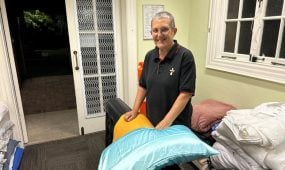Prevention and response to domestic and family violence through the Ten Commitments
Justice & Advocacy
“It can sometimes seem as if we are becoming desensitised to domestic murders given the sheer regularity of news stories covering such atrocities. But the February 2020 murder of Hannah Clarke and her three children in Brisbane sent shockwaves throughout the Australian community,” says ACSQ DFV Project Officer Jenny Clark

Developed by the Family Violence Working Group established by the General Synod Standing Committee of the Anglican Church of Australia, the Ten Commitments for the Prevention and Response to Domestic and Family Violence (DFV) are the Church’s response to DFV within churches and church communities.
Significantly, they initiate an introspective exploration of how the Church’s culture, history and organisational composition may have contributed to the level of violence experienced by Anglican community members.
The Ten Commitments are a resounding call to action for leaders in the Anglican community to reflect on their knowledge and lived experience in this area; recognise DFV in all its forms and seek regular training and information updates; and, ensure the Ten Commitments are being given life in sphere(s) of influence.
While physical violence in relationships is widely recognised as a form of abuse, it is crucial to understand that abuse takes on many forms, often leaving no visible marks on the victim. People who use domestic violence use the tools of violence and abuse available to them. In faith communities this can result in the misuse of authority, theology, teaching and many other things to support, excuse or justify abuse.
It can sometimes seem as if we are becoming desensitised to domestic murders given the sheer regularity of news stories covering such atrocities. But the February 2020 murder of Hannah Clarke and her three children in Brisbane sent shockwaves throughout the Australian community.
What followed was an outpouring of community grief followed by a state government inquiry and policy reforms in Queensland that will see changes in legislation, education and responses for many years to come. One major reform will make coercive control a stand-alone criminal offence, which the Queensland Attorney-General noted (when the Legislation Amendment Bill passed) “is about identifying and responding to the red flags of coercive control earlier before blue police tape surrounds another family home”.
Advertisement
Coercive control can be defined as a pattern of behaviours that is cumulative and designed to exert power and control by one person over another in a domestic relationship. Coercive control uses fear, isolation and dependence as mechanisms of control. A victim of coercive control is often the last person to recognise this as domestic violence.
Some examples of coercive control behaviours may include degrading put-downs, gaslighting, micro-managing a partner’s life (for example, what they wear, when and what they can eat or where they can work), isolation (often gradually) from family and friends, imposition or restricting of religious practice, humiliation and threats, limiting or controlling access to money, monitoring movements or using technology and social media to control and manipulate.
Making a distinction between behaviour such as voicing an opinion about what someone should do or not do and coercive control is an important part of understanding how coercive control works. Behaviour may be rude or mean, but when does it become coercive control? Does it form a pattern, is the behaviour escalating, does it go hand-in-hand with other behaviours and most importantly does it involve coercion based on fear through threats about what will happen if the victim does not comply?
Advertisement
We know that inequality, especially gender inequality and power inequality, is central to domestic and family violence. We know that domestic and family violence can happen in any relationship — age, wealth, status, gender identification, sexual orientation and educational achievement will not immunise someone from using or experiencing violence.
We know that women separating from an abusive relationship are especially vulnerable. This is the most dangerous time for a woman, both from her former partner and also new partners.
We also know that children who witness DFV are experiencing domestic violence. Children are especially vulnerable, often blaming themselves or being blamed by a parent for the violence. They can also develop unrealistic levels of responsibility to keep a parent safe. Children can, as adults, and especially in times of stress, default to the patterns of behaviour modelled by their parents in childhood. As adults we are responsible for teaching children that violence is a personal choice.
So in terms of action, practically, we can ask ourselves: what do we know, at a personal level, about DFV? How does our own experience impact our thinking and behaviour in this area? How do we increase our own knowledge? How do we care for ourselves? What behaviours, including language, might better reflect the Ten Commitments? Do we use or experience violence? Can we identify tools of abuse in our own operating environments? Are we comfortable calling out poor behaviours?
Related Story
 Video
Video
What is coercive control?
For consideration when it comes to your staff and volunteers, what training has been made available for them? Do they know where and how to access good services? How do you support people experiencing or using violence? How might the new Queensland legislation impact on your work and practice?
For the people in our communities such as parishioners, students and families, clients and our community partners: how do we bring them along on our journey? How do we apply and give visibility to the Ten Commitments across our areas of responsibility?
Author’s note: The Anglican Church Southern Queensland (ACSQ) is committed to the rollout of the Ten Commitments as our Church’s response to domestic and family violence. This includes encouraging links with local support services.
The following 24/7 telephone services have a long track record responding to people experiencing domestic and family violence:
- DV Connect 1800 811 811 helps Queenslanders wanting to leave an abusive relationship.
- 1800RESPECT is a national service providing information, referrals, and counselling.
If you, or the person you are assisting, are in immediate danger please call the Police on 000.
Editor’s note: This feature is based on a reflection written for the Diocesan Leadership Team in May (Queensland DFV Prevention Month). For a full copy of the original reflection, please email Jenny Clark via jennifer.clark@anglicanchurchsq.org.au.





